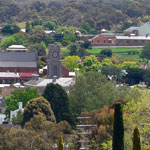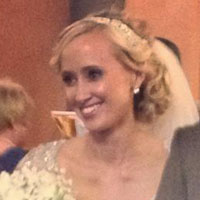Today begins a two week break from the parish, which may or may not translate into a two week break from this blog.
The break is not a holiday per se, but my “annual course,” which is an activity all members of Opus Dei are encouraged to do. In my case, it’s a good way for me to build up fraternity with the other diocesan priests in Australia who are in Opus Dei.*
My “annual course” is a course insofar as part of each day is dedicated to study. Last year, we studied the Compendium of the Catechism; the year before that was a revision of metaphysics. I don’t know what we’ll study this year.
But the annual course isn’t all study. There’s also sport, bush walking, time to read, or watch movies, or blog (!), and lots of prayer in common. Also, there is alcohol. I can’t imagine priests getting together to relax without generous provisions of cold beer, good wine and single-malt whisky. Not that we get drunk — that’s something I’ve relegated to my seminary days. (I’d like to think I’ve grown in virtue, but maybe I’m just getting too old to nurse a hangover.)
The annual course is a bit like a retreat, and a bit like a school camp, but it’s mostly like the annual vacation of a very large family. Being one of nine, I remember very well that our trips to the Gold Coast were certainly holidays, but organised holidays. A large family can’t not have a routine.
Like most things in Opus Dei, the annual course originated with the founder. I wonder if St Josemaría didn’t have the annual course of members in mind, when he wrote this:
I have always seen rest as time set aside from daily tasks, never as days of idleness.
Rest means recuperation: to gain strength, form ideals and make plans. In other words it means a change of occupation, so that you can come back later with a new impetus to your daily job.
This certainly sums up my experience of the annual course. It’s a great way to spend two weeks: restful, and also invigorating. If anything, my prayer life is strengthened and consolidated, which is more than can be said about some of my other holidays.
I hope to blog, but it isn’t easy when I’m away from my desktop computer. I guess I’ll have to get a notebook or iPad eventually, but in the meantime, I find a smartphone suffices. Too bad for me I dropped my iPhone one too many times this week, and smashed the screen! I hope its replacement is waiting for me when I return to the parish.
* Note
Canonically, I’m a priest incardinated to the Diocese of Ballarat, rather than the Prelature of Opus Dei, which is analogous to a diocese. I am, though, a member of the Priestly Society of the Holy Cross, which still makes me a priest in Opus Dei.
People sometimes ask me if I’ve ever thought about leaving the Diocese of Ballarat, and becoming a priest of the prelature. The answer is no. I joined Opus Dei for two reasons: (1) because I believe the Lord called me to join; and (2) because Opus Dei helps me to better serve my diocese. If I was to ever leave the Ballarat diocese, Opus Dei would have failed in its objective, so it wouldn’t make sense to seek incardination in the prelature.





I have come, the long way, to appreciate the contribution of Opus Dei to the Church. The many different ways that Opus Dei supports us diocesan priests has to be experienced to be believed. Opus Dei priests and laity make a very particular contribution to our spiritual, physical and emotional wellbeing.
I think it is time for the Australian Church to officially engage Opus Dei to provide some of the very necessary ‘Professional Development’ for Diocesan Priests. The Diocesan Seminaries are hard pressed to train the seminarians, what is really lacking is annual refresher courses on a variety of topics such as you are attending. For priests such as myself in isolated rural areas, use of the internet to deliver such courses must become a reality.
I’d like to comment as a layperson, Fr Mick Mac Andrew, on the many gifts Opus Dei, its priests and members, give to the Church. I think their priests need to run more parishes. Their gentle but also muscular Christianity, emphasis on formation and study of the faith and the profound importance of confession are all like a steady rain on the parched deserts which pass for contemporary Catholic communities.
These people also practise what they preach – great models!
Oh Fr. John the Caulfield Geauines are on tomorrow! Long John is running in the race. The race is at 5.45pm! I also think Charlie Boy in same race.
Another tips for tomorrow Race 5No 2 and 7.
Race9 No. 1 and 8.
Race 1No9.
In Adealaide Morphetive
Race6 No6. The Shaman
Race7 No12. Point Danger
Race8 No12. On A Dream.
At Randwick
Race 2No9
Race4 No7
Race6 No7
Race7 No7
Race 8no12.
Also tomorrow Bathurst is on and cricket on gem.But Melbourne to Warrnambool bike race is on. Some of race is the highway and some are not! Enjoy your weekend and don’t forget all my tips are each way and happy punting from Simon the Pieman.
I also like yoesi at caulfield! I hope people are happy reading my tips.
I forgot to mention race 7no 9. One of my favourite jockeys to ride Jason benbow!
I wonder how many priests like you Fr. John in the ballarat diocese and in Australia? I will back later in the week for my derby tips! Keep up the good work Fr. John Famous Corrigan!
A couple of weeks ago on October 13, 2013 Pope Francis consecrated the world to the Immaculate Heart of Mary but he didn’t use the word “consecrate” or “world” or “Immaculate Heart”. Hmmm… did he really do anything at all. He really didn’t consecrate anything because he never mention what it was. To consecrate is to set apart as sacred. To entrust is to put under the supervision. Those are two very different things. Seems to be a “fake” consecration in my opinion. Read what he said for yourself. A Fatima group recorded his exact words in Italian and then translated them to English. Pope Francis’ actual words can be found here. http://www.cfnews.org/page88/files/323745fe729940ab655a46013cacdcf7-150.html
You source a schismatic organisation, founded by “Father” Nicholas Gruner, who had his faculties removed and is or was not in good standing with the Church. Opinions by people belonging to the SSPX sects are usually hostile to the holy father, the Ordinary rite of the Mass and to the documents of Vatican 11. The CFO is in truth a protestant, not a catholic organisation.
I should have said CFN – Catholic Family News – not CFO.
More on the shadowy “Fr” Gruner here:
http://www.catholicculture.org/culture/library/view.cfm?recnum=4086
Readers of this blog can search for material on the Fatima Crusader and judge for themselves. I won’t be commenting further.
Hi. Greetings from the Philippines, Fr.! I am contemplating if I have the vocation towards joining Opus Dei and I have a question. Since I started attending Opus Dei activities, I admire the role of Opus Dei priests. My question is here, “Do only numeraries and associates are elevated to priesthood in the prelature?”. I was wondering if celibate supernumerary members can also be invited by the Prelate to become priests? Lastly, is it possible to become a supernumerary first then shift to the numerary and associate membership? Thank you!
Hi Brian! I’m probably not the best person to ask. I think a numerary would know more about this than I do.
From what I understand, though, I don’t think a supernumerary member would ever be asked to become a priest. I thought supernumeraries are those people in Opus Dei who have discerned a married vocation. Certainly there are supernumeraries who are married, and supernumeraries who are single, but even if those single supernumeraries never marry, that’s not really the same as being celibate, is it?
(I mean, technically, that’s exactly what celibacy is — the unmarried state — but that’s not the way we use the word. In the Church, we tend to distinguish between celibate and unmarried-but-open-to-marriage.)
I would have thought that an Opus Dei member who had discerned that marriage was not their vocation, but who wished to maintain their financial independence, would become not a supernumerary, but an associate. In fact, I think you could liken associate members to “supernumeraries who are celibate.”
So, I’m pretty sure that while numeraries become numerary priests, and associates become auxiliary priests, and diocesan priests who join Opus Dei become associate priests or supernumerary priests, there’s no provision for lay supernumeraries in the Work to become priests.